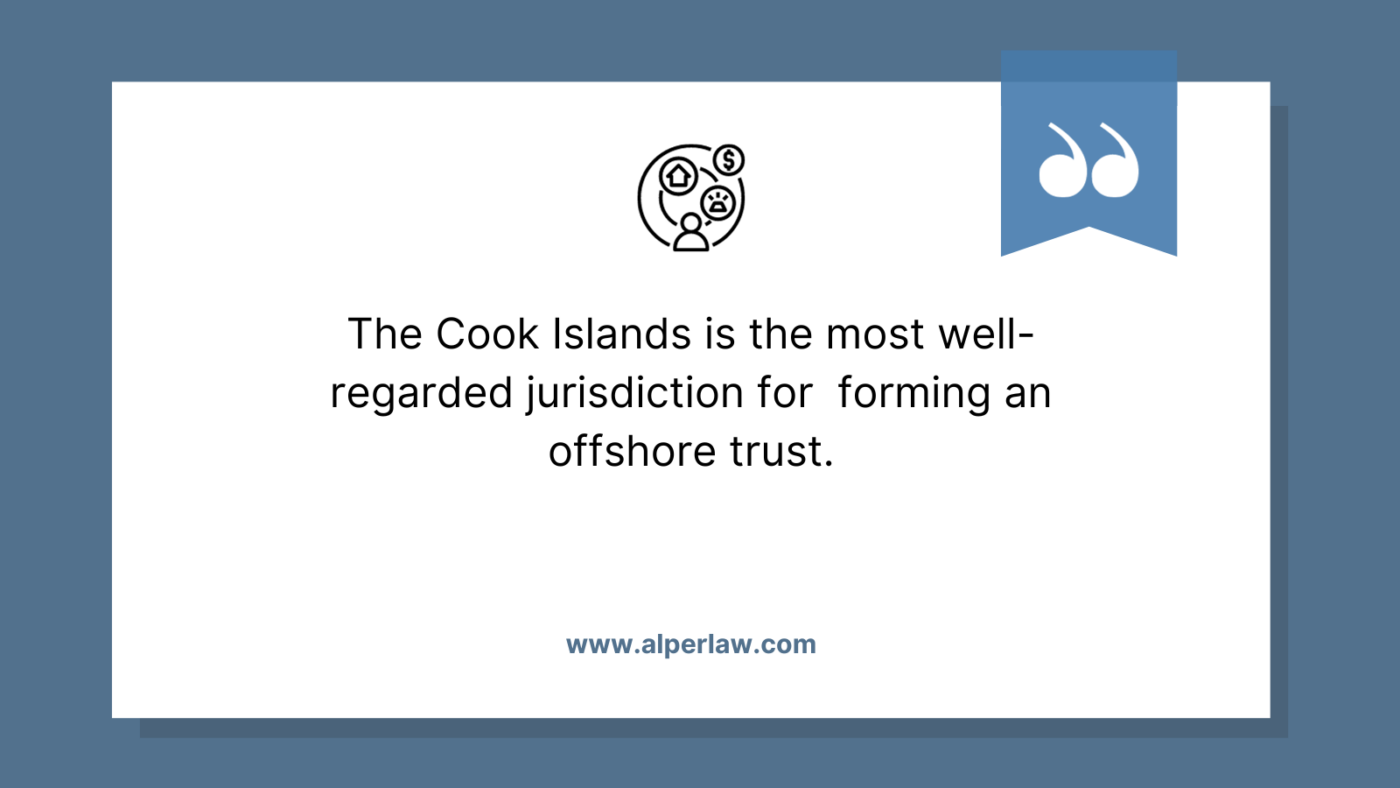An offshore trust is an irrevocable trust formed under the laws of a foreign country to protect assets from U.S. creditors. Offshore trusts are considered the premier asset protection tool, making it very difficult for a U.S. creditor to collect.
The Cook Islands is the best offshore trust jurisdiction for most people. The Cook Islands offers a combination of statutory and common law features that provide certainty and security that other offshore trust jurisdictions may lack. Cook Islands statutes are straightforward, predictable, and effective. They allow enforceability of the trust agreement terms.
Why Should You Form an Offshore Trust?
Forming an offshore trust can be a good idea for protecting your money from legal issues, like lawsuits or creditors, because these trusts are set up in countries with laws that help keep your assets safe. It’s also a way to manage your wealth privately and potentially save on taxes, as some countries offer benefits like lower taxes for trusts.
When you put your assets into an offshore trust, they’re moved under the legal umbrella of a foreign country whose laws are often much more protective when it comes to keeping those assets safe.
This means if you ever face legal challenges like lawsuits or claims from creditors back in your home country, these assets are harder to reach because they’re not directly in your name anymore and they’re protected by the foreign country’s laws.
This can provide a strong shield for your wealth, helping to ensure that it remains secure against various legal threats you might encounter.
We help protect your assets from creditors.
We give customized advice to clients nationwide. Get answers from our attorneys by phone or Zoom.

Why Do People Form Trusts in the Cook Islands?
The Cook Islands is the most well-regarded jurisdiction for forming an offshore trust. Here’s why:
- Pioneering Asset Protection: The Cook Islands was among the first jurisdictions to implement modern asset protection trust legislation with its International Trusts Act in 1984. This legislation offers strong barriers against creditors.
- Strong Legal Barriers for Creditors: The Cook Islands places significant obstacles in the way of foreign creditors. To challenge a Cook Islands trust, a creditor must:
- Bring their claims to a Cook Islands court.
- Prove “beyond a reasonable doubt” (a very high standard) that the trust was established to defraud that particular creditor.
- Act within a limited timeframe. Once the trust is established, there’s a narrow window during which claims can be made against the trust’s assets.
- No Recognition of Foreign Judgments: The Cook Islands does not automatically recognize foreign judgments, meaning a creditor who obtains a judgment in another country would need to litigate their claim anew in the Cook Islands, facing the abovementioned challenges.
- Flexibility in Trust Structuring: Trusts in the Cook Islands can have a variety of purposes and structures, including discretionary trusts, charitable trusts, and purpose trusts.
- Confidentiality: The Cook Islands provides privacy for trust settlors and beneficiaries. Trust details are not part of the public record.
- Stable Political and Legal Environment: The Cook Islands features a stable political climate and a legal system based on English common law.
- Self-Settled Trusts: Unlike some jurisdictions, the Cook Islands allows for self-settled trusts, where the settlor can also be a discretionary beneficiary.
- Duress Protection: The Cook Islands offers provisions to protect trust assets in cases where the settlor is under duress. For example, suppose a judgment debtor is compelled by a U.S. court to instruct the Cook Islands trustee to transfer assets back to the United States. In this situation, the Cook Islands trustee would be prohibited from complying.

Best Countries for Offshore Trusts
When considering forming an offshore trust for asset protection, privacy, or tax planning, choosing the right jurisdiction is crucial. Here are the best in our opinion:
- Cayman Islands: Known for their strong privacy laws and absence of direct taxes, the Cayman Islands are a popular choice for offshore trusts.
- Switzerland: With a long-standing reputation for financial stability and privacy, Switzerland is a preferred choice, especially for those seeking a European jurisdiction.
- Cook Islands: The Cook Islands are renowned for their robust asset protection laws, making them a top choice for trusts designed to shield assets from legal claims.
- Isle of Man: Offering a stable legal and political environment, the Isle of Man is known for its investor-friendly policies and tax advantages.
- Belize: Belize is favored for its English-based legal system, strong asset protection laws, and the relatively quick and straightforward process of setting up a trust.
Each of these jurisdictions offers unique advantages and may be more suitable for different types of trust arrangements and individual goals.
Forming an Offshore Trust If You Already Have a Judgment
In some situations, other countries may be a better fit. In particular, a person with a money judgment entered against themselves will find it difficult to establish a Cook Islands trust. Forming a trust in Hungary may be a more appropriate solution in those cases.